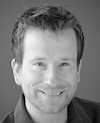Ongoing debates: the environment as the principle cause?The
second considers particular historical changes in the environment to be an
important cause, but still acknowledges the role of chance. Fitness landscapes
can help us visualise this option since they allow us to more easily see the
shaping role of the environment. In this view natural selection acts merely to
drive organisms up hill, but the actual ends of evolution are dictated (caused)
by the contours of their environment. Natural selection performs a role analogous
to the influence of gravity on objects moving on a physical landscape (albeit a
bizarre form of gravity that drives things up hill instead of down). This is
essentially Gould’s position. Pointing to the pivotal role of the ‘K - T’
asteroid impact that separated the Cretaceous and the Tertiary period and
ushered in a dinosaur free world and allowed the rise of mammals and humans, he
says that “in an entirely literal sense, we owe our existence, as large and
reasoning mammals, to our lucky stars.”
Printer-friendly | Feedback | Contributed by: Adrian Wyard |





